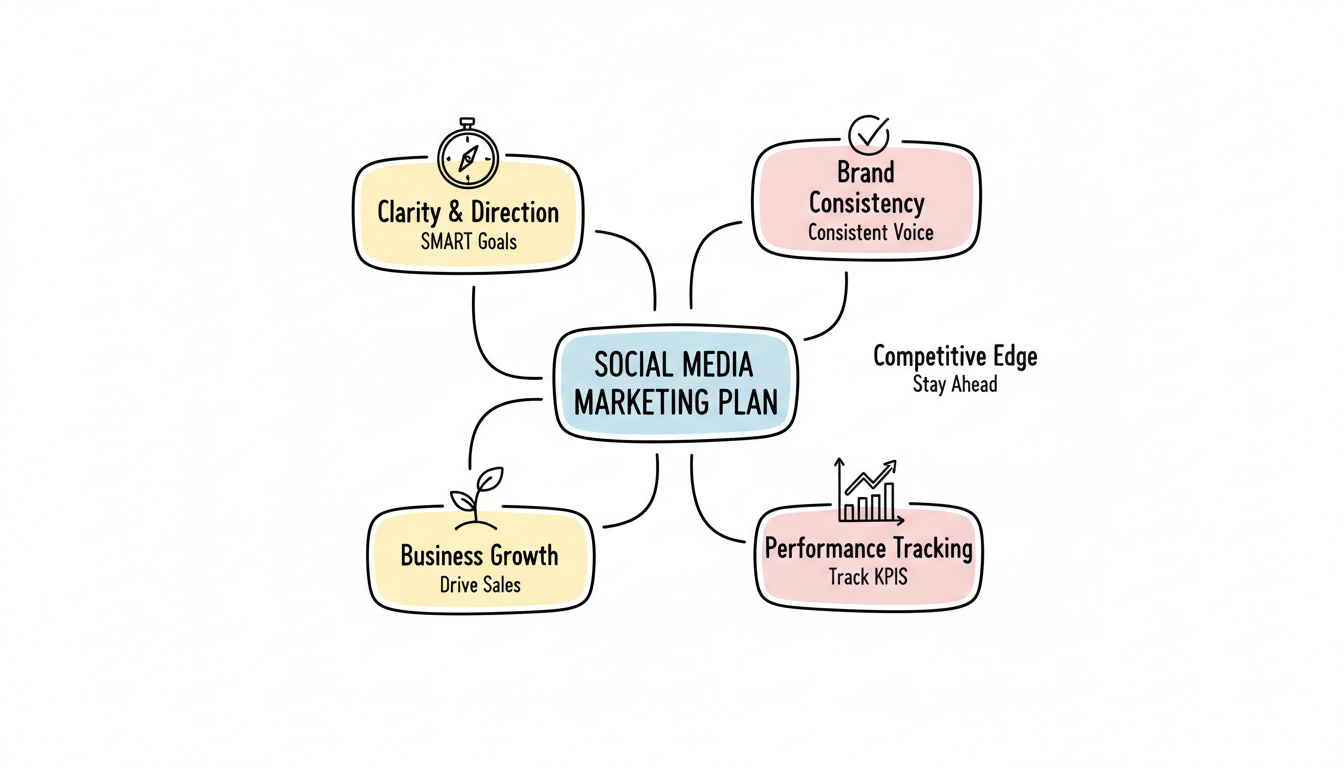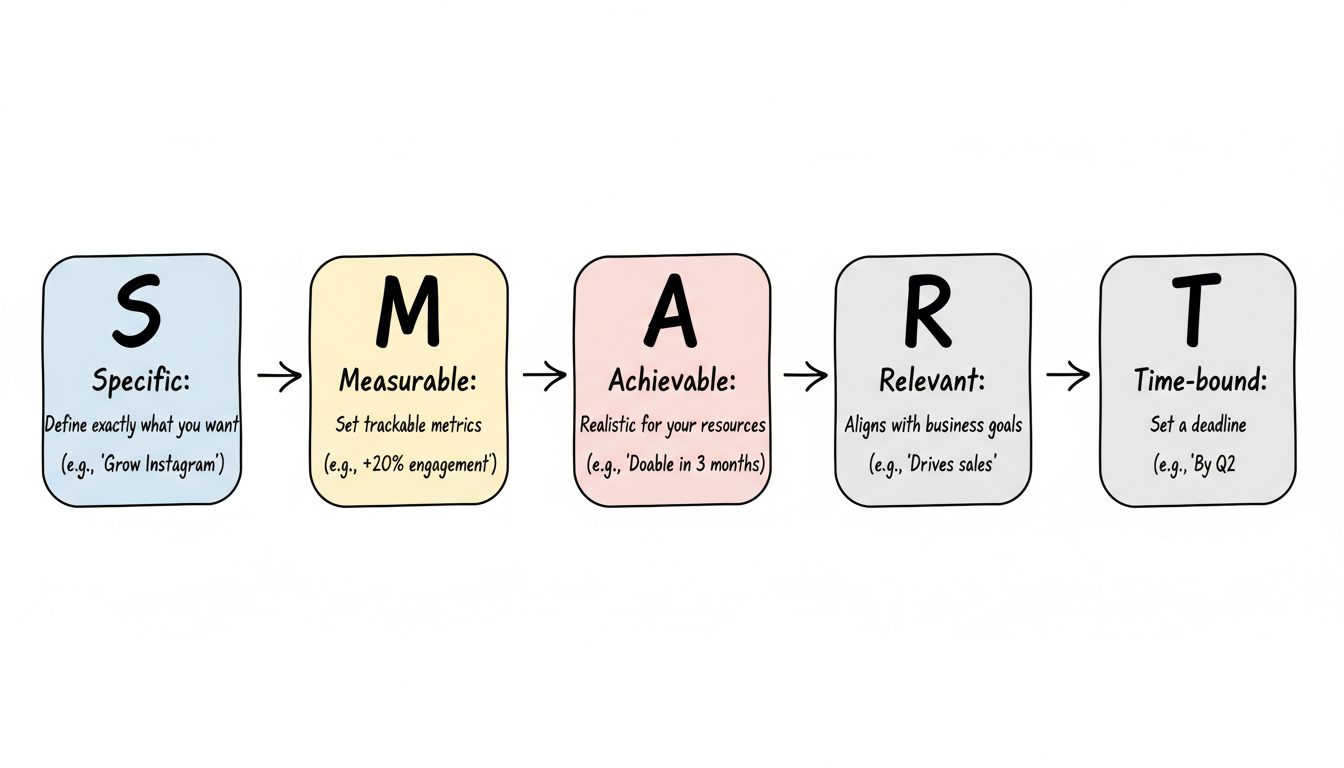In today's digital age, social media has become an essential tool for businesses to reach and engage with their target audience. However, simply having a presence on social media is not enough. To truly succeed in this competitive landscape, businesses need to develop a well-structured social media marketing plan. This article will guide you through the process of building a winning social media marketing plan for your business.
Social media plays a crucial role in today's business landscape. It has transformed the way businesses connect with their customers, build their brand, and drive sales. With over 3.78 billion social media users worldwide, the potential reach and impact of social media cannot be ignored.
A social media marketing plan provides a roadmap for businesses to effectively leverage social media platforms and achieve their marketing goals. It outlines the strategies, tactics, and activities that will drive engagement, increase brand visibility, and ultimately help businesses grow their bottom line.
In today's interconnected world, social media has become an integral part of our daily lives. From sharing personal experiences to discovering new products and services, people rely on social media platforms to stay informed and connected. As a business, tapping into this massive audience base is essential for staying competitive.
Social media allows businesses to directly engage with their target audience, build relationships, and establish brand credibility. It provides a platform for businesses to showcase their products or services, share valuable content, and gain valuable feedback from customers. In addition, social media platforms offer powerful advertising tools and analytics that can help businesses optimize their marketing efforts.
For example, let's say you own a small bakery. With a well-crafted social media marketing plan, you can use platforms like Instagram and Facebook to showcase your delicious creations, engage with your customers through comments and direct messages, and even run targeted ads to reach potential customers in your local area. By leveraging the power of social media, you can increase brand awareness, attract more customers to your bakery, and ultimately boost your sales.
A well-structured social media marketing plan offers numerous benefits for businesses. Firstly, it provides clarity and direction by defining the goals, target audience, and key performance indicators (KPIs) of your social media campaigns.
By setting SMART (Specific, Measurable, Achievable, Relevant, Time-bound) goals for your social media campaigns, you can ensure that your efforts are focused and aligned with your overall business objectives. Whether you aim to increase brand awareness, drive website traffic, generate leads, or boost sales, a clearly defined plan will guide your actions and measure your success.
Moreover, a social media marketing plan helps businesses stay organized and consistent in their messaging. It outlines the types of content to be shared, the tone of voice to be used, and the key messages to be conveyed. This consistency builds brand recognition and helps establish your business as a thought leader in your industry.
For instance, if you own a fitness studio, your social media marketing plan may include a mix of motivational quotes, workout tips, success stories from your clients, and behind-the-scenes glimpses of your studio. By consistently sharing content that resonates with your target audience, you can position yourself as an authority in the fitness industry and attract more clients to your studio.
In addition, a social media marketing plan allows businesses to stay ahead of their competition. By conducting thorough research on your competitors' social media strategies, you can identify gaps and opportunities in the market. This knowledge can help you differentiate your brand, offer unique value to your customers, and ultimately gain a competitive edge.
Furthermore, a well-structured social media marketing plan enables businesses to track and analyze their performance. By regularly monitoring key metrics such as engagement rate, reach, and conversion rate, you can identify what's working and what's not. This data-driven approach allows you to make informed decisions, optimize your social media campaigns, and achieve better results over time.

In conclusion, a social media marketing plan is a valuable tool for businesses looking to harness the power of social media. By defining clear goals, targeting the right audience, and executing well-planned strategies, businesses can effectively leverage social media platforms to build their brand, engage with their customers, and drive sales. So, if you haven't already, it's time to create a comprehensive social media marketing plan and unlock the full potential of social media for your business.
Before diving into the specifics of your social media marketing plan, it is crucial to identify your goals. Setting clear and actionable goals is the foundation of an effective social media strategy.
When it comes to social media marketing, it's important to have a roadmap that guides your efforts. This roadmap starts with defining your goals. By clearly outlining what you want to achieve, you can create a targeted and focused strategy that will yield better results.
But how do you go about identifying your social media marketing goals? It starts with understanding your business and what you hope to accomplish through your social media efforts.
SMART goals provide a framework for setting objectives that are specific, measurable, achievable, relevant, and time-bound. For example, instead of setting a generic goal to "increase social media engagement," a SMART goal would be to "increase Instagram engagement by 20% within the next three months."
Setting SMART goals helps you create a clear roadmap for success. By being specific about what you want to achieve, you can focus your efforts on the right strategies and tactics that will drive the desired results.
When setting your SMART goals, consider the key metrics that align with your objectives. These may include the number of followers, likes, comments, shares, reach, website traffic, leads generated, or conversion rates. By defining these metrics, you can track your progress and make data-driven decisions to optimize your social media campaigns.
For instance, if your goal is to increase website traffic, you can track the number of visitors coming from social media platforms and analyze which channels are driving the most traffic. This data can help you make informed decisions about where to focus your efforts and allocate your resources.

Your social media goals should align with your overall business objectives. For instance, if your business objective is to increase sales by 20% in the next quarter, your social media goal could be to drive more targeted traffic to your website and convert them into paying customers.
By aligning your social media goals with your business objectives, you ensure that your efforts contribute directly to the growth and success of your business. This alignment also helps in securing buy-in from key stakeholders and obtaining the necessary resources and support for your social media initiatives.
When your social media goals are in sync with your business objectives, you create a cohesive strategy that maximizes your chances of success. It allows you to leverage the power of social media to achieve tangible business outcomes.
Furthermore, aligning your social media goals with your business objectives helps you prioritize your efforts. It ensures that you are focusing on activities that have a direct impact on your bottom line and are in line with your long-term vision.
In conclusion, identifying your social media marketing goals is a critical step in creating an effective strategy. By setting SMART goals and aligning them with your business objectives, you can create a roadmap that guides your efforts and maximizes your chances of success. So take the time to define your goals and watch as your social media campaigns flourish.
With numerous social media platforms available, it's essential to choose the right ones that align with your target audience and business objectives. Each platform offers unique features and caters to different demographics and interests.
Facebook, with over 2.7 billion active monthly users, is the largest social media platform and provides a broad reach for businesses targeting a diverse audience. Instagram, with its visually appealing content, is ideal for businesses in the fashion, beauty, and lifestyle industries.
LinkedIn, known as the professional networking platform, is valuable for business-to-business (B2B) companies and individuals looking to establish professional connections. Twitter, with its real-time updates, is great for businesses that thrive on timely news and customer interactions.
To determine the best social media platforms for your business, consider your target audience's demographics, preferences, and behaviors. Conduct market research and analyze your competitors' social media presence to get insights into where your audience spends their time online.
Additionally, consider the type of content you plan to create, as different platforms are better suited for specific types of content. For instance, if you plan to focus on video content, platforms like YouTube or TikTok may be more suitable.
Creating engaging social media content is the key to capturing your audience's attention and driving meaningful interactions. When developing your content strategy, consider the various types of content that resonate with your audience.
Various types of social media content can be used to engage your audience. These include informative blog articles, visually appealing images or infographics, entertaining videos, thought-provoking quotes, user-generated content, and interactive polls or quizzes.
Experiment with different content formats and analyze their performance to identify what resonates best with your audience. This can be done through social media analytics tools or by soliciting feedback directly from your audience.
When creating social media content, keep in mind these tips:
Creating a social media content calendar enables you to plan and schedule your content in advance, ensuring consistency and efficient management of your social media presence.
Consistency is key when it comes to social media marketing. Regularly posting high-quality content keeps your audience engaged and helps you stay top of mind. A content calendar allows you to organize your content in a structured manner, ensuring that you maintain a consistent posting schedule.
When organizing your social media content calendar, consider the following:
In conclusion, building a winning social media marketing plan is essential for businesses to effectively leverage the power of social media. By understanding the importance of a social media marketing plan, identifying your goals, choosing the right platforms, creating engaging content, and implementing a content calendar, you can drive meaningful connections, increase brand awareness, and achieve your business objectives. Start building your social media marketing plan today and unlock the full potential of social media for your business!
By submitting this form, you agree to our Privacy Policy and Terms & Conditions.